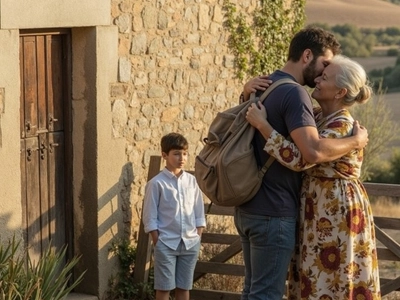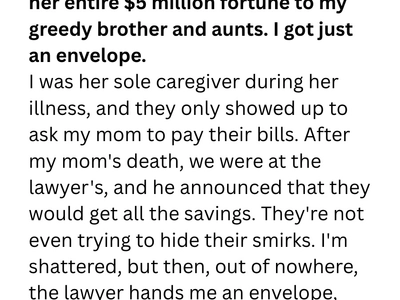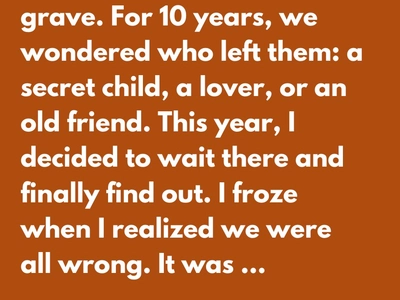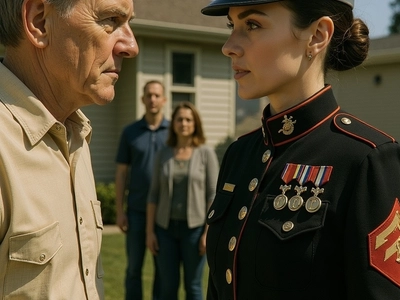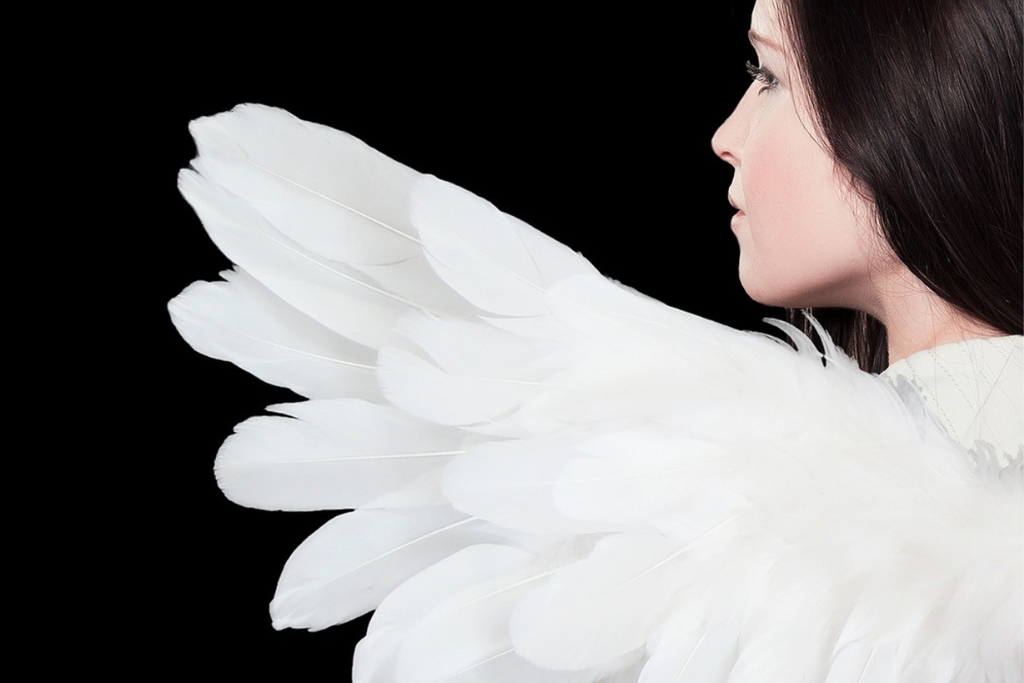My uncle had just been released, and while the whole family turned their backs on him, only my mother opened her arms to welcome him…
When my uncle got out of prison, nobody wanted to see him. The family avoided even saying his name. To them, he was a stain that would never wash away. But my mother wasn’t like the rest. When he stood at our gate—thin, worn, carrying a tattered backpack and a shadow of shame—she opened the door wide and said softly, “Come in, brother. You’ll always have a place here.”
I’ll never forget that moment. Her voice was calm but firm, filled with the kind of kindness that didn’t ask for approval. The relatives called her foolish. They whispered, “He’s bad blood. Once a criminal, always a criminal.” But my mother just smiled sadly and said, “He’s still family. Blood doesn’t disappear because others choose to forget it.”
I was old enough to understand that our family’s name didn’t carry much pride anymore. After my father died when I was in fifth grade, everything changed. He’d been the glue that held everyone together. When he passed, the relatives stayed long enough to eat, cry, and say kind words—but when the last tear dried, they went home and never looked back.
My mother worked herself to the bone. She took on every job she could find—washing clothes, cleaning houses, selling food at the market—just to pay for my schooling. I remember how she’d come home late, her hands rough, her eyes tired, but she’d still smile when she saw me studying at the table.
The only person who kept visiting us back then was my uncle—my father’s younger brother. He was full of life, always joking, always bringing something small for me—a comic book, a toy car, sometimes just a candy. But that light went out after the night he got drunk and hurt someone in a fight. He went to prison, and everyone cut him off. My mother cried when she heard the news, but she never said a bad word about him.
Years passed. I grew up. The world moved on. Then one day, the gate creaked, and there he was—older, thinner, with eyes that carried both guilt and hope. That’s when my mother welcomed him home, just like she had promised herself years ago.
He moved into my father’s old room. Every morning, he’d head out with his worn boots and come back covered in dust, carrying whatever he could earn. In the afternoons, he’d sweep the yard, repair the broken fences, and tend to the plants as if they were something sacred.
Once, I saw him digging in the back garden. “What are you planting, Uncle?” I asked.
He smiled, wiped the sweat from his forehead, and said, “Something that will feed kind hearts.”
I didn’t understand, so I just laughed. To me, it was one of his strange sayings.
Life went on quietly like that for a few years—until everything fell apart again.
The family business we’d tried to build went bankrupt. I lost my job. And worst of all, my mother got sick. The hospital bills came one after another until the numbers blurred into hopelessness. I sold what I could, but it was never enough. One night, sitting alone in the dark, I stared at the house and thought about putting it up for sale. It was the only thing left that could bring in money.
That’s when my uncle came in. He didn’t say much. He just looked at me with eyes that seemed to see right through me. Then he said softly, “Come with me. Don’t ask questions.”
We left early the next morning. The car groaned as it climbed the narrow mountain road. The higher we went, the quieter the world became—no city noise, no horns, just the sound of wind brushing through the trees. When we reached the top, he stopped the car and got out.
“Come,” he said, waving me forward.
Before us stretched a wide piece of land surrounded by forest. A small wooden house stood in the middle, with a garden bursting with flowers and fruit trees. I stared, speechless.
“Whose place is this, Uncle?” I asked.
He smiled—a tired but peaceful smile. “Ours. It belongs to the family.”
He told us that after leaving prison, he’d worked anywhere that would take him—construction, farms, fishing boats. Every coin he saved went into buying this land. For ten years, he worked, built the small house, and planted the garden—all without telling anyone.
My mother couldn’t stop crying. I hugged her, and for the first time in a long while, I felt something like hope.
“Uncle,” I asked quietly, “why didn’t you use that money for yourself? You could’ve started over somewhere else.”
He shook his head. “When you’ve made mistakes, you don’t start over by running away. You start by giving back to those who still believe in you. This is my way of saying thank you.”
That night, we stayed in the little house. The air was cool and smelled of grass and fruit blossoms. My mother slept peacefully for the first time in months. I sat outside under the stars, listening to the quiet rustle of the leaves. My uncle sat beside me, smoking slowly, lost in thought.
“You know,” he said finally, “people think the worst thing about prison is the walls. But it’s not. It’s forgetting what it feels like to be trusted. Your mother… she never stopped believing I could be better. That’s why I’m still here.”
We stayed there for weeks. The mountain air did wonders for my mother. Her cheeks gained color again, and her laughter returned. The fruits from my uncle’s orchard were the sweetest I’d ever tasted. Travelers sometimes stopped by to buy them, saying, “They taste different—so sweet.” My uncle would smile and say, “They’re grown with gratitude.”
One day, while cleaning the small house, I found a wooden box tucked away under his bed. On the lid were carved words: “If you’re reading this, I’m already resting in peace.”
My hands trembled as I opened it. Inside was a folded document—the deed to the land—in my name. Beneath it lay a letter written in his shaky handwriting.
“I’m not good with words,” it began, “so I planted instead. Thank you, and your mother, for never turning your backs on me. Don’t fear mistakes, Tin. Fear losing your kindness.”
I couldn’t finish reading. The words blurred through my tears.
A few months later, my uncle started coughing blood. The doctor’s face said everything before he even spoke. It was cancer—too late to treat. My mother sat by his bed every day, holding his hand, feeding him soup, wiping his forehead.
One afternoon, when I came into the room, he looked at me, smiled faintly, and whispered, “Tin… promise me something. Don’t hate life. It’s easy to hate. But living with a kind heart—that’s the hard part.”
He turned to my mother, his voice barely a whisper. “Sister… I’m sad I won’t see Tin get married. But I’m happy he understands now what it means to live well.”
He passed away that evening, quietly, like a candle burning down to its last light.
The funeral was simple. No fancy flowers, no long speeches. Just a few neighbors, my mother, and me. We buried him on the land he loved so much, under a tall mango tree that he’d planted himself.
After everyone left, I stood there for a long time. The wind blew softly through the branches, carrying the scent of ripe fruit. I could almost hear his voice whispering, “Don’t hate the world. Live well, and life will be good to you.”
A year passed. The garden he planted grew wild and full, overflowing with fruits and flowers. We started selling them to travelers again, and the income slowly pulled us out of debt. People would still say, “These fruits taste different—sweeter somehow.”
And every time they said that, I’d smile and think of my uncle.
He’d been the man everyone rejected—the one they called trouble, disgrace, failure. But to me, he became proof that a person’s past doesn’t define their heart.
Sometimes, when the sun sets over the trees, I sit on the porch of that small wooden house and watch the sky turn gold. The air smells of earth and blossoms, and I feel a peace that’s hard to explain. It’s like the land itself remembers him—every leaf, every flower, every fruit carrying a bit of his spirit.
I think back to all those moments I didn’t understand—the times he stayed quiet when others mocked him, the times he worked until his hands bled, the time he said he was planting “something to feed kind hearts.” Now I know what he meant. He wasn’t just planting fruit. He was planting forgiveness, love, and second chances.
My mother often sits beside me, her hair now streaked with silver. Sometimes she whispers, “Your father would be proud of him.” And I always nod, because I know it’s true.
Without my uncle, we might have lost everything—our home, our hope, even our belief in goodness. But because my mother chose compassion when everyone else chose judgment, our story became something different.
Whenever people ask me who my hero is, they expect me to say my father or some famous name. But I always answer, “My uncle—the man the world turned away, who taught me what kindness really means.”
He showed me that love isn’t about perfection. It’s about forgiveness, loyalty, and the courage to believe in someone when nobody else does. And every time I walk through that garden, I feel his lesson in every step: mistakes can fade, shame can heal, and even the roughest hands can grow something beautiful.
